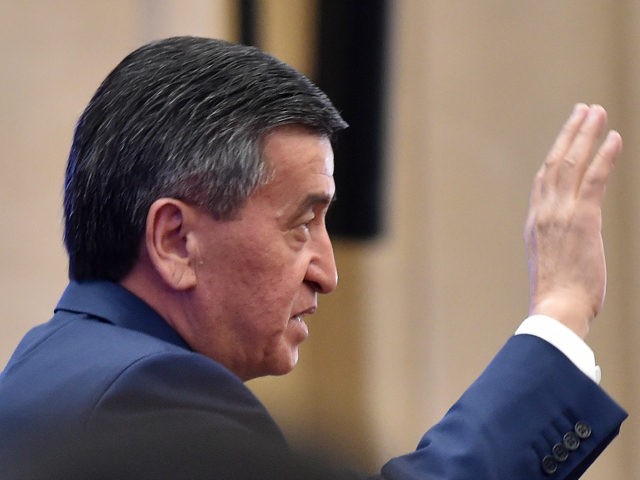Kyrgyzstan’s President Sooronbai Jeenbekov resigned on Thursday following a tumultuous week that saw a convicted kidnapper sprung from prison on October 6 elected prime minister four days later. Kyrgyzstan’s political upheaval began on October 4 in response to a disputed parliamentary election.
In a statement released through his official website on October 15, Jeenbekov said he decided to step down “because peace and unity in our country is more important than any post.”
By resigning, Jeenbekov became the third Kyrgyz president in the past 15 years to be forced out of office during a popular uprising.
“I am not holding onto power. I do not want to be known in the history of Kyrgyzstan as a president who spilled blood and shot at his own citizens,” he said. “So I decided to resign.”
Jeenbekov explained that despite his approval of Parliament’s decision on Wednesday to elect – for a second time in four days following a disputed first vote – convicted kidnapper Sadyr Japarov as Kyrgyzstan’s prime minister, “the aggressive moods did not disappear and calls for my resignation continued.”
He urged Japarov and other politicians to persuade their supporters to leave Kyrgyzstan’s capital, Bishkek, where they have led anti-government rallies since October 4, and restore a sense of normalcy to the city.
He pleaded:
The current situation is close to a bilateral conflict. On the one hand, there are the protesters, and on the other, the law enforcement agencies. Servicemen and law enforcers are obliged to use weapons to protect the state residence. In this case, there will be bloodshed. It is inevitable. I am calling upon both parties to avoid yielding to provocations.
Kyrgyzstan’s new prime minister, Sadyr Japarov, addressed a crowd of his supporters outside a government building in Bishkek late Thursday following Jeenbekov’s resignation.
“All power is in my hands from now on,” he declared.
“Former President Sooronbai Jeenbekov has resigned. The parliament speaker said it was impossible to perform [the president’s] duties and resigned. Today, the duties of the acting president and the prime minister have passed to me,” Japarov told the emotional crowd, some of whom appeared to be shedding tears in video footage of the gathering.
“Thank you very much. You can go home now,” Japarov added:
An estimated 5,000-6,000 people swarmed Bishkek on the morning of October 5 to protest the results of parliamentary elections the day before. The protesters claimed the election results were fraudulent, citing alleged evidence of vote-buying to benefit pro-Jeenbekov politicians, and demanded that Kyrgyzstan’s Central Elections Commission cancel the results.
“Members of more than 10 political parties, which failed to secure seats in the legislature, took part in the rally,” according to Russian state news agency TASS. The rally turned violent later that night, as rioters stormed the Parliament building and set fire to the main government building, known as the White House.
In response, the Central Elections Commission canceled the October 4 election results. Since then, however, various political factions have jockeyed for control of Kyrgyzstan, encouraging massive protests to continue in the capital and spread nationwide.
Japarov’s supporters sprang him from prison on October 6 at the height of the post-election turmoil. Prior to his jailbreak, he had been serving an 11.5-year sentence after being convicted in 2017 of kidnapping a regional governor. Although some media outlets at the time claimed a Kyrgyz court acquitted Japarov of the kidnapping charges upon his release, local Kyrgyz news outlet 24.kg refuted these claims, reporting, instead, that the country’s supreme court had upheld Japarov’s kidnapping charges after a requested review of his case.
Japarov has described the kidnapping charges against him as politically motivated. Prior to his imprisonment, he served as a member of Kyrgyzstan’s Parliament and as an adviser to former Kyrgyzstan President Kurmanbek Bakiev. A previous political uprising in 2010 ousted Bakiev. Kubatbek Boronov served as Kyrgyzstan’s most recent prime minister until he was forced to resign during the country’s latest political upheaval on October 6, creating an opportunity for Japarov to seize power.
Jeenbekov had insisted as late as Wednesday that he would not resign until new parliamentary elections were held. According to Russia’s state news agency TASS on Thursday, “An election rerun date is to be set before November 6.”
Russian President Vladimir Putin’s deputy chief of staff, Dmitry Kozak, visited Kyrgyzstan on Monday and met with both Jeenbekov and Japarov, the Kyrgyz presidential office said in a statement posted to its website. Kozak visited the ex-Soviet state “on behalf of Russian President Vladimir Putin,” according to the statement. The talks emphasized the “key role of the head of state” in ensuring Kyrgyzstan’s future development, the Russian embassy in Kyrgyzstan said on Tuesday.
Kozak’s visit marked Moscow’s first visible intervention in Kyrgyzstan’s political crisis since it began on October 4. Moscow regards Kyrgyzstan as its closest Central Asian ally and maintains a military airbase there. Ex-Kyrgyz President Jeenbekov was largely viewed as a pro-Kremlin ruler. Jeenbekov met with Putin in Sochi, Russia, for diplomatic talks as recently as September 28, less than a week before Kyrgyzstan held its fateful October 4 parliamentary election.
The day before Jeenbekov’s meeting with Putin, “hundreds of people staged an ‘independence march’ protest in the capital Bishkek … after a video surfaced online in which a pro-presidential party leader spoke of a need to integrate more closely with Russia,” Reuters reported on October 2.
“Forces opposed to the stability and development of our country have stepped up their activity on the eve of the election,” Jeenbekov said in response to the march.
Kyrgyzstan’s political unrest serves as the latest threat to Russian influence in ex-Soviet regions. It joins the ongoing anti-government protests in Kremlin-allied Belarus and recent clashes between Turkish-allied Azerbaijan and Russian-allied Armenia in the breakaway region of Nagorno-Karabakh in the South Caucasus. As in Kyrgyzstan, Russia operates a military base in Armenia.

COMMENTS
Please let us know if you're having issues with commenting.